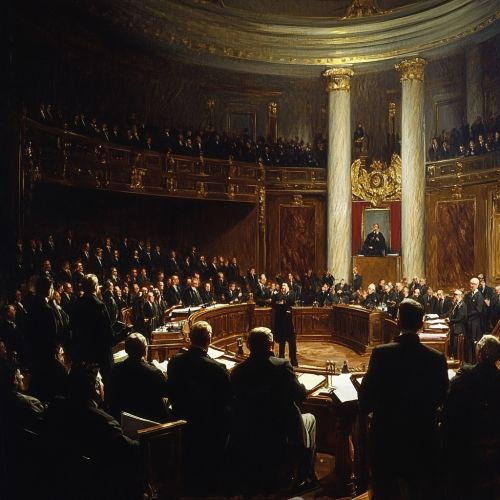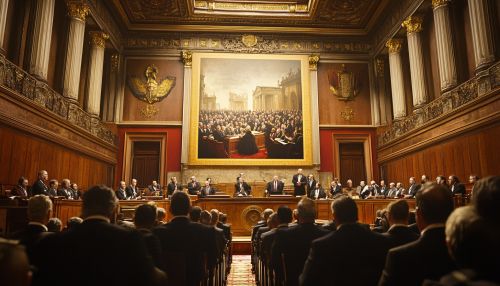Political Drama: Difference between revisions
(Created page with "== Introduction to Political Drama == Political drama is a genre of narrative fiction that focuses on political events, systems, and figures, often exploring the complexities and intricacies of governance, power dynamics, and societal impacts. This genre can be found across various media, including theatre, film, television, and literature. Political dramas often delve into the ethical and moral dilemmas faced by individuals in positions of power, the in...") |
No edit summary |
||
| Line 33: | Line 33: | ||
The exploration of political ideologies and the conflicts they generate is another common theme in political drama. These narratives often depict the clash between opposing political beliefs and the resulting tensions within society. By examining the motivations and consequences of ideological conflicts, political dramas provide insight into the complexities of political discourse and the challenges of achieving consensus. | The exploration of political ideologies and the conflicts they generate is another common theme in political drama. These narratives often depict the clash between opposing political beliefs and the resulting tensions within society. By examining the motivations and consequences of ideological conflicts, political dramas provide insight into the complexities of political discourse and the challenges of achieving consensus. | ||
[[Image:Detail-98475.jpg|thumb|center|A dramatic scene depicting a political debate in a grand legislative chamber, with politicians passionately arguing their positions.|class=only_on_mobile]] | |||
[[Image:Detail-98476.jpg|thumb|center|A dramatic scene depicting a political debate in a grand legislative chamber, with politicians passionately arguing their positions.|class=only_on_desktop]] | |||
== Impact and Influence == | == Impact and Influence == | ||
Latest revision as of 05:46, 15 October 2024
Introduction to Political Drama
Political drama is a genre of narrative fiction that focuses on political events, systems, and figures, often exploring the complexities and intricacies of governance, power dynamics, and societal impacts. This genre can be found across various media, including theatre, film, television, and literature. Political dramas often delve into the ethical and moral dilemmas faced by individuals in positions of power, the influence of political ideologies, and the consequences of political actions on both personal and societal levels.
Historical Development
Ancient and Classical Roots
The origins of political drama can be traced back to ancient civilizations, where theatrical performances often served as a medium for political commentary. In Ancient Greece, playwrights like Aristophanes used comedy to critique political figures and policies, while Sophocles and Euripides explored themes of power and justice in their tragedies. Similarly, in Ancient Rome, playwrights such as Plautus and Seneca incorporated political themes into their works, reflecting the political climate of their times.
Renaissance and Enlightenment
During the Renaissance, political drama evolved alongside the rise of nation-states and the increasing complexity of political systems. William Shakespeare's historical plays, such as "Julius Caesar" and "Richard III," examined the nature of political power and its impact on individuals and society. The Enlightenment period further expanded the scope of political drama, with playwrights like Voltaire and Beaumarchais using their works to critique authoritarian regimes and advocate for social reform.
Modern and Contemporary Era
In the modern era, political drama has continued to evolve, reflecting the changing political landscapes and societal concerns. The 20th century saw the emergence of playwrights such as Bertolt Brecht, who used his works to challenge political ideologies and promote social change. In contemporary times, political drama has expanded into film and television, with series like "The West Wing" and "House of Cards" exploring the intricacies of political life in the United States.
Themes and Characteristics
Political dramas often explore a wide range of themes, including power, corruption, justice, and the impact of political decisions on individuals and society. These narratives typically feature complex characters, intricate plots, and a focus on dialogue and political discourse. The genre often employs elements of satire, tragedy, and comedy to convey its messages, allowing for a nuanced exploration of political issues.
Power and Corruption
A central theme in political drama is the exploration of power and its potential for corruption. Many works in this genre depict the moral and ethical dilemmas faced by individuals in positions of authority, highlighting the tension between personal ambition and public duty. This theme is often explored through the portrayal of political figures who must navigate the complexities of governance while grappling with their own desires and motivations.
Justice and Morality
Political dramas frequently examine the concepts of justice and morality, questioning the fairness and integrity of political systems and decisions. These narratives often challenge audiences to consider the ethical implications of political actions and the impact of these decisions on society. By presenting complex moral dilemmas, political dramas encourage viewers to reflect on their own beliefs and values.
Ideology and Conflict
The exploration of political ideologies and the conflicts they generate is another common theme in political drama. These narratives often depict the clash between opposing political beliefs and the resulting tensions within society. By examining the motivations and consequences of ideological conflicts, political dramas provide insight into the complexities of political discourse and the challenges of achieving consensus.


Impact and Influence
Political drama has had a significant impact on both popular culture and political discourse. By engaging audiences with compelling narratives and thought-provoking themes, this genre has the power to shape public opinion and influence political debates. Political dramas often serve as a catalyst for discussion and reflection, encouraging audiences to consider the complexities of political life and the responsibilities of citizenship.
Cultural Significance
The cultural significance of political drama lies in its ability to reflect and critique the political realities of its time. By addressing contemporary issues and concerns, political dramas provide a mirror for society, allowing audiences to engage with the political landscape in a meaningful way. This genre has the potential to inspire social change by raising awareness of political injustices and advocating for reform.
Educational Value
Political dramas also hold educational value, offering audiences insight into the workings of political systems and the challenges faced by those in power. By presenting complex political scenarios and ethical dilemmas, these narratives encourage critical thinking and promote a deeper understanding of political processes. As a result, political dramas can serve as a valuable tool for educating audiences about the intricacies of governance and the importance of civic engagement.
Notable Works and Figures
Throughout history, numerous works and figures have made significant contributions to the genre of political drama. These individuals and their creations have helped shape the development of the genre and its impact on society.
Playwrights and Authors
Several playwrights and authors have been instrumental in the evolution of political drama. William Shakespeare, with his historical plays, laid the foundation for the exploration of political themes in drama. Bertolt Brecht's innovative approach to theatre, known as Epic Theatre, challenged audiences to think critically about political issues. Other notable figures include George Bernard Shaw, whose plays often addressed social and political themes, and Arthur Miller, whose works explored the moral and ethical dilemmas faced by individuals in positions of power.
Film and Television Creators
In the realm of film and television, creators such as Aaron Sorkin and Beau Willimon have made significant contributions to the genre of political drama. Sorkin's "The West Wing" provided a nuanced portrayal of political life in the United States, while Willimon's "House of Cards" offered a darker exploration of power and corruption. These creators have helped bring political drama to a wider audience, using the medium of film and television to engage viewers with compelling narratives and thought-provoking themes.
Conclusion
Political drama is a dynamic and evolving genre that continues to captivate audiences with its exploration of political themes and issues. By examining the complexities of power, justice, and ideology, political dramas offer valuable insights into the workings of political systems and the challenges faced by those in positions of authority. As a reflection of society's political realities, this genre serves as both a mirror and a catalyst for change, encouraging audiences to engage with the political landscape in a meaningful way.
